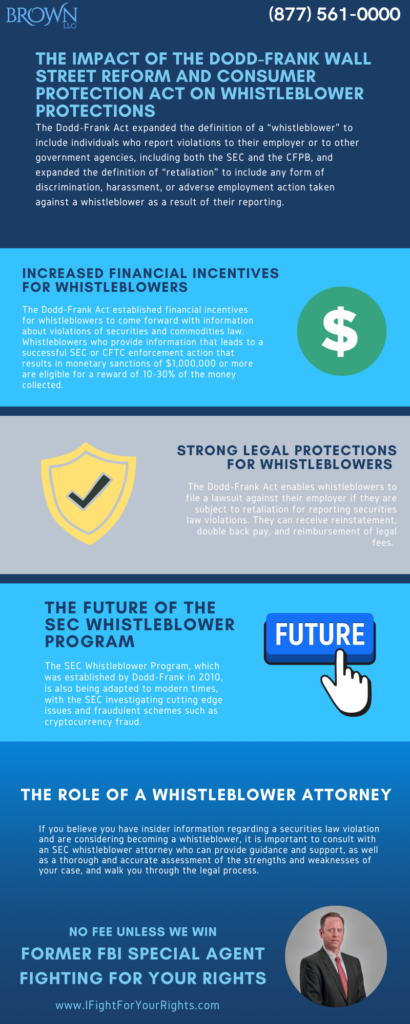The Impact of the Dodd-Frank Wall Street Reform and Consumer Protection Act on Whistleblower Protections

Table of Contents
Introduction to the Dodd-Frank Wall Street Reform and Consumer Protection Act
The Dodd-Frank Wall Street Reform and Consumer Protection Act, enacted in 2010, was established to regulate the financial industry and protect consumers following the 2008 financial crisis. This comprehensive financial regulatory reform law established a new agency, the Consumer Financial Protection Bureau (CFPB), expanded the powers of existing agencies, and created a host of new laws and regulations designed to protect consumers especially with regard to risky financial and investment products, and to protect the housing market and the mortgage industry from another financial collapse. One of the key provisions of the Dodd-Frank Act was the strengthening of whistleblower protections for those who report securities law violations to the Securities and Exchange Commission (SEC).
The Impact of the Dodd-Frank Act on Whistleblower Protections
Prior to the Dodd-Frank Act, whistleblowers were only protected from retaliation by their employer if they reported securities law violations directly to the SEC. The Dodd-Frank Act expanded the definition of a “whistleblower” to include individuals who report violations to their employer or to other government agencies, including both the SEC and the CFPB, and expanded the definition of “retaliation” to include any form of discrimination, harassment, or adverse employment action taken against a whistleblower as a result of their reporting.
Increased Financial Incentives for Whistleblowers
The Dodd-Frank Act also established financial incentives for whistleblowers to come forward with information about securities and commodities law violations. Whistleblowers who provide information to the SEC that leads to a successful enforcement action are eligible for a reward of 10-30% of the money collected from the enforcement action that results in monetary sanctions of $1,000,000 or more. However, whistleblowers who obtained their information as a member or employee of a government or regulatory agency or through a financial audit required by the SEC, or are convicted of a crime related to the SEC’s regulatory enforcement action, are not eligible to receive any award. There are numerous other eligibility requirements for the whistleblower award, so you should consult an experienced whistleblower law firm like Brown, LLC to maximize your chances of obtaining an award and in the highest possible amount.
Similarly, the Dodd-Frank Act also amended the Commodities Exchange Act to create a whistleblower program under the Commodity Futures Trading Commission (CFTC), which oversees the U.S. derivatives markets, including futures, options, and swaps. CFTC’s whistleblower program and award process are similar to the SEC’s Whistleblower Program. So, the CFTC pays awards to whistleblowers who provide information to the CFTC resulting in a successful enforcement action with monetary sanctions of $1,000,000 or more. Eligible whistleblowers are entitled to receive between 10% and 30% of the amount of the monetary sanctions.
Importantly, both the SEC and CFTC whistleblower programs allow whistleblowers to file their complaints anonymously through the use of a whistleblower attorney.
Speak with the Lawyers at Brown, LLC Today!
Over 100 million in judgments and settlements trials in state and federal courts. We fight for maximum damage and results.
Strong Legal Protections for Whistleblowers
The Dodd-Frank Act provides whistleblowers with the right to file a lawsuit against their employer if they are subject to retaliation for reporting securities law violations. The Act also allows whistleblowers to seek relief from the SEC if they are subject to retaliation, including reinstatement, double back pay, and reimbursement of legal fees. These protections ensure that whistleblowers can report illegal and unethical practices without fear of losing their job or facing other adverse employment actions.
These financial incentives and protections have been extremely successful in encouraging whistleblowers to come forward with information about securities law violations. In 2022, the SEC announced that approximately $229 million was whistleblowers that year, marking one of the highest years in terms of the whistleblower award amount. Since the inception of the SEC Whistleblower Program, more than $1.3 billion have been awarded to whistleblowers.
The Future of the SEC Whistleblower Program
The SEC Whistleblower Program, which was established by Dodd-Frank in 2010, is also being adapted to modern times, with the SEC investigating cutting edge issues and fraudulent schemes such as cryptocurrency fraud. For example, in 2022, of more than 12,000 SEC whistleblower complaints that the agency received, the third most common complaint category was in “Initial Coin Offering and Cryptocurrencies.” The SEC has seen significant success in this largely unregulated arena; just last year, crypto lender BlockFi agreed to pay the SEC $100 million to settle claims that it sold and offered unregistered securities and investment products. Moreover, as a result of the FTX collapse, the lack of regulation and agency oversight governing the cryptocurrency market has taken center stage in the minds of regulators and legislators. Congress and the SEC will be increasingly relying on whistleblowers to bring to light illegal activity and financial abuse that are harmful to investors and consumers alike.
The Role of a Whistleblower Attorney
If you believe you have insider information regarding a securities law violation and are considering becoming a whistleblower, it is important to consult with an SEC whistleblower attorney who can provide guidance and support, as well as a thorough and accurate assessment of the strengths and weaknesses of your case, the pros and cons of filing a whistleblower claim, and walk you through the legal process. A whistleblower attorney can advise on the potential risks and rewards of reporting securities law violations, assist in the preparation of a report to the SEC, and represent whistleblowers during all steps of the SEC whistleblower process as well as potentially contact other Department of Justice entities to enhance your recovery. At Brown, LLC, our experienced attorneys are dedicated to protecting the rights of whistleblowers and ensuring that they receive the full protection of the law.
The Dodd-Frank Wall Street Reform and Consumer Protection Act has had a significant impact on whistleblower protections, providing financial incentives for individuals to report potential securities violations and strong legal protections for whistleblowers who face retaliation as a result of their reporting. If you are considering becoming a whistleblower, it is important to work with an experienced whistleblower attorney like Brown, LLC who can help you understand your rights and navigate the process.
Can a Whistleblower Be Fired Under Dodd-Frank?
An SEC whistleblower is protected from retaliation under Dodd-Frank only if they engage in a protected activity after filing a formal complaint with the SEC. If properly submitted through an SEC whistleblower law firm, the complaint can be filed anonymously, which inherently minimizes the risk of employer retaliation since the identity of the individual is obscured. However, Dodd-Frank itself does not protect whistleblowers who only report internally. That’s where the Sarbanes-Oxley Act (SOX) steps in. SOX covers employees who report suspected fraud internally, such as to a supervisor, compliance officer, or audit committee. The interplay between Dodd-Frank, SOX, and other whistleblower protections is complex. It’s best to consult experienced SEC whistleblower counsel early in the process to preserve both your confidentiality and your legal rights.
Congress understands the importance of incentivizing whistleblowers to come forward without the fear of retaliation. They provided statutory protections under 15 U.S.C. § 78u-6(h):
“(h)Protection of whistleblowers (1)Prohibition against retaliation (A)In general No employer may discharge, demote, suspend, threaten, harass, directly or indirectly, or in any other manner discriminate against, a whistleblower in the terms and conditions of employment because of any lawful act done by the whistleblower—…(B)Enforcement (i)Cause of action An individual who alleges discharge or other discrimination in violation of subparagraph (A) may bring an action under this subsection in the appropriate district court of the United States for the relief provided in subparagraph (C). (iii)Statute of limitations (I)In general An action under this subsection may not be brought— (aa) more than 6 years after the date on which the violation of subparagraph (A) occurred; or (bb) more than 3 years after the date when facts material to the right of action are known or reasonably should have been known by the employee alleging a violation of subparagraph (A). (II)Required action within 10 years Notwithstanding subclause (I), an action under this subsection may not in any circumstance be brought more than 10 years after the date on which the violation occurs. (C)Relief Relief for an individual prevailing in an action brought under subparagraph (B) shall include— (i) reinstatement with the same seniority status that the individual would have had, but for the discrimination;”
If a whistleblower is fired as a result of them invoking their rights under Dodd-Frank or from overtly filing an SEC whistleblower claim, they can bring a retaliation lawsuit to court and/or to the SEC to recover damages. Potential recovery includes reinstatement of the position and two times the backpay owed, including interest, plus attorney’s fees and costs. It is notable to point out that the Supreme Court has ruled that to be protected, the case must be filed with the , see Digital Realty Trust, Inc. v. Somers, 583 U.S. 79 (2018). Filing under internal reporting mechanisms within the company does not trigger protection under Dodd-Frank, however it may have protections under Sarbanes-Oxley so its best to speak with an SEC whistleblower lawyer before taking any action to understand your rights.
Case Studies: Largest Dodd-Frank Whistleblower Payouts
Notably, the SEC typically discloses minimal information in connection with the SEC whistleblower payouts, except for the SEC whistleblower amount awarded. Nevertheless, the public press releases give some insight into the priorities of the SEC in these cases:
- May 5, 2023: The largest SEC award granted to date was issued in May 2023. The whistleblower received nearly $279 million. According to the Director of SEC’s Division of Enforcement, the whistleblower provided multiple interviews and written submissions that were critical to the success of the enforcement.
- October 22, 2020: The second highest amount awarded was $114 million. In this alleged claim, the whistleblower was recorded reporting their concerns internally multiple times, despite having to endure personal and professional hardships.
- September 15, 2021: The SEC provided an SEC whistleblower award of $110 million and $4 million to two separate whistleblowers. The first whistleblower was noted as providing significant independent analysis that helped lead to an enforcement action. The second whistleblower provided further original information that was given after the SEC had already taken significant steps in the initial investigation, which was the reason for the difference in award. Notably, this claim led to the $1 billion mark being surpassed in aggregate awards by the SEC under the Dodd-Frank program.

